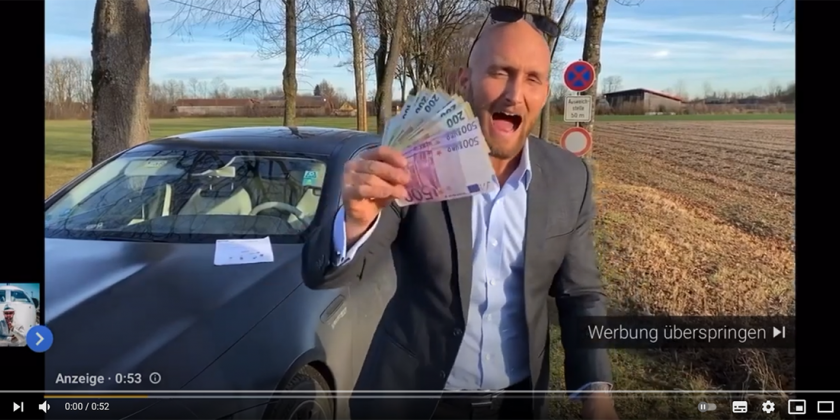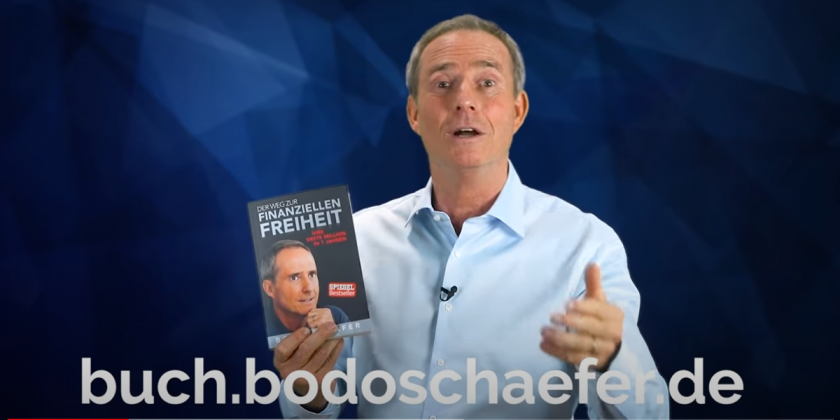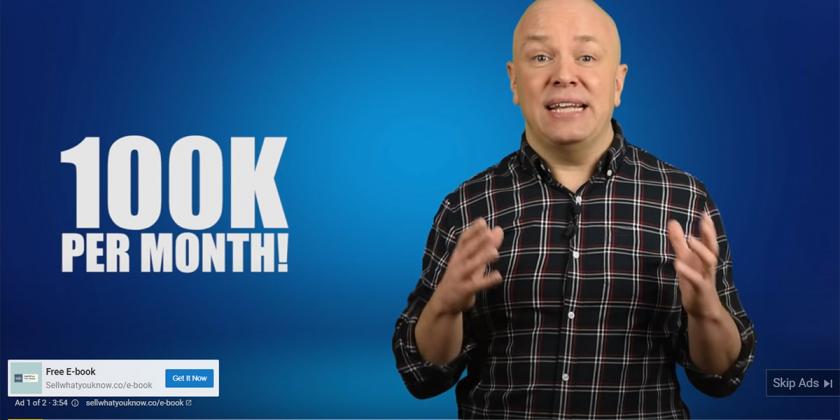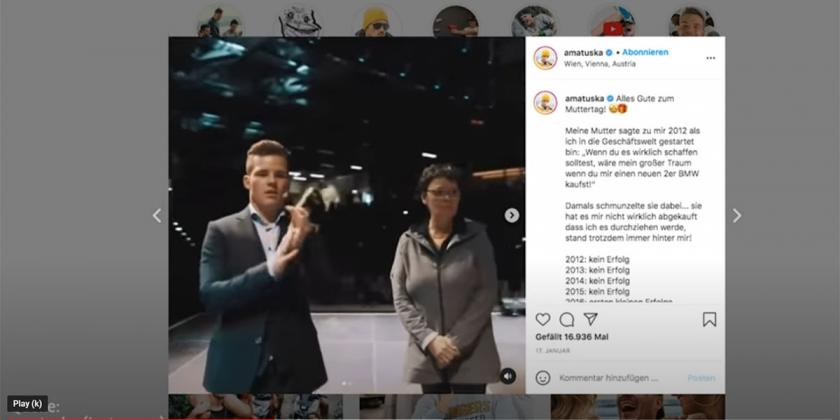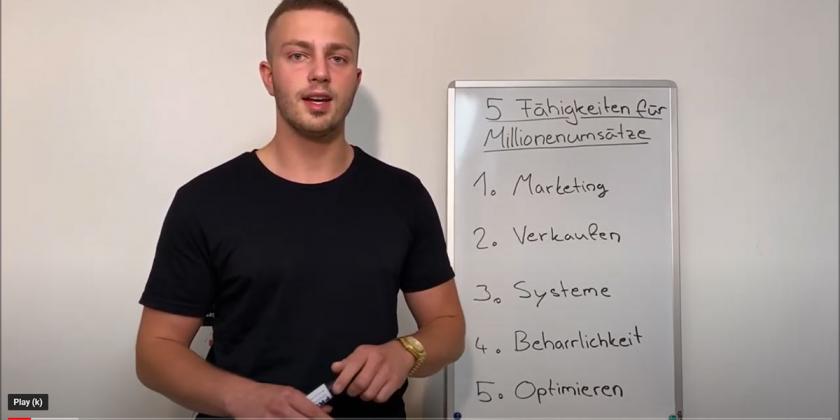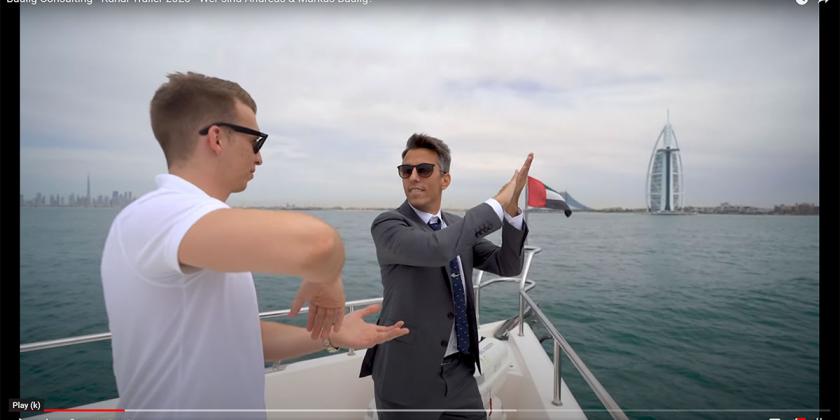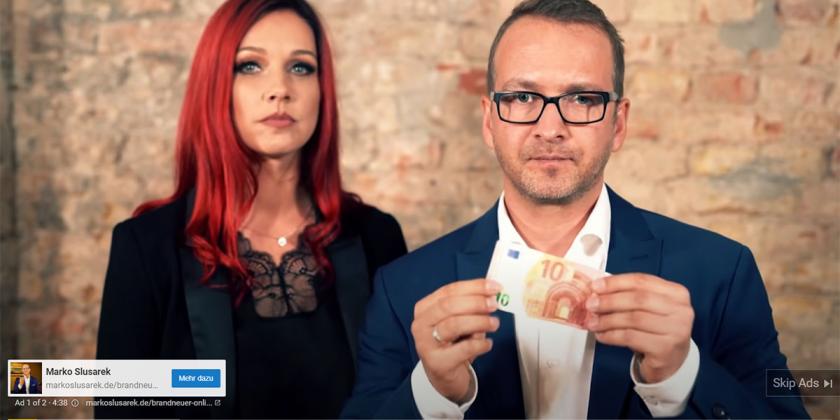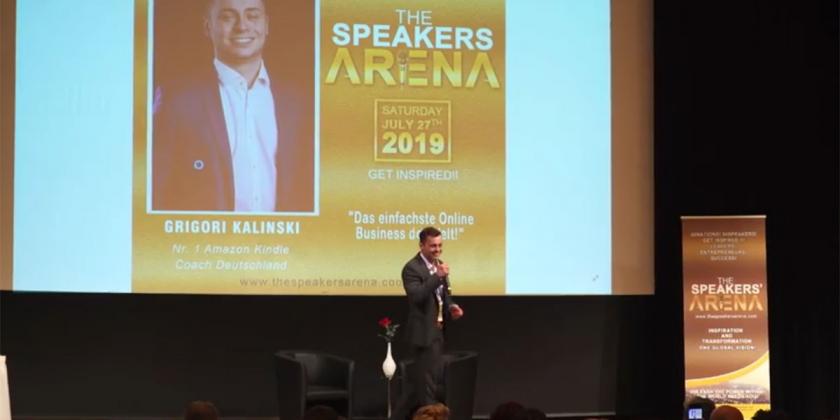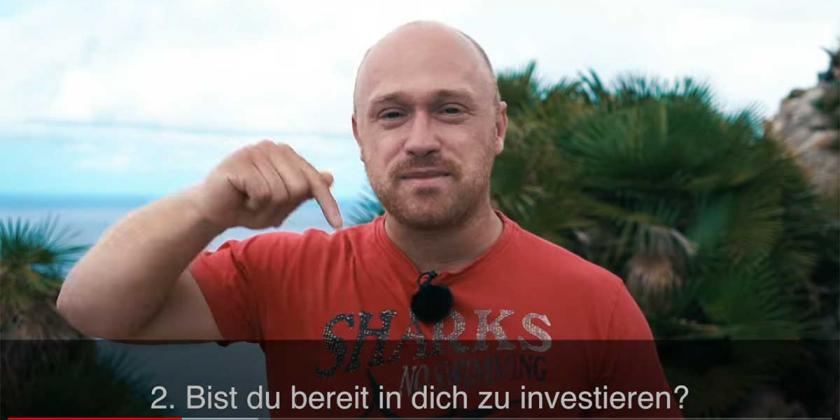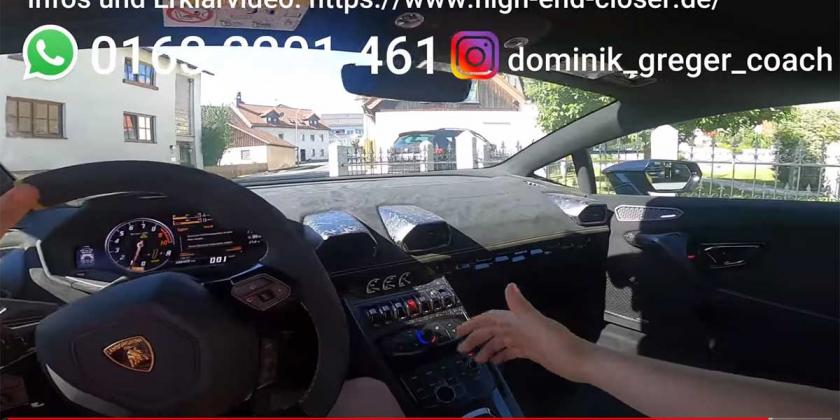
Fast cash through coaching?
Countless self-proclaimed coaches try to "scale" their business on YouTube, Instagram, Facebook and TikTok by selling highly dubious business models with their image of success. We do not find this trend "nice", to stay in the language of damaged young adults. Requests for help at the ECC continue to increase because of the coaching rip-off. An enormous wave of advertisements with get-rich-quick instructions is intended to chill young viewers in particular with the wealth on display and is flooding social media.
Modern Heirs to Charles Ponzi

The "business model" of the most famous con man in the USA, Charles Ponzi, has been the eponym since the 1920s. The fraud concept called "Ponzi Scheme" in English is usually called pyramid scheme or snowball system in German. In the 1920s, Ponzi succeeded in convincing investors to invest in a fraudulent investment scheme with promised dreamlike returns and little risk. These pyramid schemes are organised to pay out the money collected from new investors to existing investors. That is, they generate returns for older investors by acquiring new investors. The scheme has no other business basis. A pro forma business idea is used to camouflage the secret of success of the early participants.
In order to recruit as many new investors as possible behind such a scheme, the organisers put themselves in the limelight as financial geniuses or gurus with other special knowledge with full-bodied promises. A hype and a sectarian community is skilfully constructed with the same core message:
"If I can do it, so can you, once I tell you the secret."
To attract a mass of new entrants, the narrowest circle pays out the promised return to old, existing investors for a certain period of time to fuel their usually aggressive recruitment with success stories. The profits from the commissions are then presented as proof of the success of the investments, and the number of new investors grows exponentially as long as the belief in success continues.
A classic example - Pulse Empire

Journalist Nadia Kailouli made an investigative documentary for ARD about the Endler brothers' networking marketing scam "Pulse Empire" in 2019 and attempted to report on the phenomenon from the inside. The investment business model initially worked with a lot of loudmouth advertising on YouTube, and returns of between 5 and 10% were promised.
The people behind the system claimed years of expertise in blockchain, crypto - and direct (or funnel) marketing. This refers to their involvement in the BitClub Network group, where fraud cases were launched against some of its members. Pulse Empire was more or less a copy of the concept of the American Bitclub Network, some of whose US operators were convicted and imprisoned.
Inexperienced young investors were invited to hyped events and made investments in speculative transactions via this platform of the Endler brothers through the broker FXB Trading (registered on Marshal Island) and not directly through the Cyprus-registered construct Bellatoria Corp LTD, which was behind Pulse Empire. When the broker became unreachable after a short time, the investments were lost and the Pulse Empire platform was dissolved.
What does Ponzi have in common with coaching ads on social media?
Ponzi's Ponzi scheme has been modified again and again since the 1920s. The most modern concepts often no longer address classic financial investors as in the Pulse Empire example, but "little people from the street" - in today's translation, the "little people in front of screens" - with novel-sounding but opaque constructs. Social media with people-related advertising strategies offer such gurus optimal conditions to reach naïve or frustrated minds in the broad masses and to build up a hype around their scheme. The pyramid structure has remained; the initiator profits from the earnings of the participants at the grassroots level by means of commissions.
The initially American templates have long since been copied on a globalised level, tailored to all conceivable fields of application of e-commerce and have arrived in all social media channels such as TikTok, YouTube, Facebook, Instagram, etc. The US Securities and Exchange Commission maintains a website with countless videos of get-rich-quick scam advertising videos whose operators have been sued by it. Investors can read up on the warnings and financial situation of companies on the US site investor.gov before investing. Unfortunately, there is no comparable warning service for the pan-European area, for example by the European Anti-Fraud Authority OLAF.

The American Dream of the dishwasher to the millionaire is reflected in globally dreamed online start-up projections. One can speak of a veritable coaching advertising genre. Opaque trading concepts, disruptive social media marketing strategies, dropshipping and e-commerce funnel marketing instructions, IT-related things like domain trading, webshops, cryptocurrencies or infallible persuasion techniques for customer loyalty are advertised. Especially popular at the moment are coaching sessions on Amazon Affiliate Marketing.
Common to the offers is the overload of trendy English-language fashion phrases, which above all reinforce the opacity of what is being sold in the training courses in the first place. The question of what it is really about is ignored with the killer argument of success, and if it is questioned, it is blocked with the reference to a groundbreaking but exclusive or secret innovation. The makers react allergically to uncomfortable questions that could disturb the image of the self-made hype.

Investigative programme about false promises in multi-level marketing. Interview with expert Dr. Claudia Groß and insider report from the direct marketing recruitment event "Powerday". In particular, the activity of Jim Menter is examined, who promises his participants income of €10,000 per month. The accusation of attributing unproven healing effects to direct marketing products for the purpose of sales also applies. The programme shows that only 0.1% of those recruited earn the promised profits.
Show-off and imitation
Unlike the trading pyramid schemes, the initial investment in coaching is not direct money, but attention is traded as the first currency. Part of the profitability for the creators also results from high view and click numbers, which are financially remunerated by the social media platform. The more ostentatious or emotional the message comes across, the more broadly effective it seems to be; the provocative appearance aims to reinforce the image of relentless success. Since social media channels are designed for viral trends, and their algorithms automatically feed a demographic target group certain advertisements and interlaced content, the earlier campaigns rolled out on a person-by-person basis, predominantly targeting men under 30. In the meantime, however, there is a trend towards gender balance, special coaching for women, for example under the hashtag #girl boss target female viewers. Since individual "Get rich Quick" campaigns are not particularly long-lasting, everything has to happen quickly. Countless imitators are now advertising in a similar style and fishing in the same pond. Imitation is thus the second basic principle and unites the creators with their target group in their mentality.
The advertisers have clumsily cribbed their dubious marketing strategy from other YouTube success story sellers. The customers hope to automatically make money by imitating the supposedly unprecedented idea of the coaches, although the same concept was paradoxically simply passed on by their coach one level higher, just as unimaginatively, from the role model ("mentor"). If one calculates the promised margins on all participants, the profits cannot even materialise for mathematical reasons. Innovation is only used as an advertising word here. In order to promise success with little effort, templates for action and thinking are held out in prospect. Since providers and interested parties emulate the same desire for wealth in the simplest way, the system also works so well because advertisers and advertised parties find themselves in this common expectation and the interested parties thus feel addressed in the most effective way. Early followers thus become the most conspiratorial accomplices, ensuring the expansion of the system through referrals.
Photo gallery with screenshots from social media channels and YouTube commercials to illustrate the mood and statements of the Become Rich coaches:
The psychological bag of tricks
The combination of being able to show success stories in low-threshold video messages, coupled with needs for primitively presented rewards and personal-looking address on social media that relate to everyday frustrations, unfulfilled life concepts and longings for liberation, results in a psychologically effective cocktail for channelling these needs into an affect action.
If I go along with it and it's a bad investment, then I've lost some money. But if the thing works, as it did for the others, and I don't go along, I miss out on my non-returning opportunity and am annoyed for life, participants initially think, and this is precisely where the advertisers put their emotional leverage.
In addition, elements of group dynamics are brought into play, the participants meet in Whatsapp and Facebook groups and it is suggested to newcomers that they will receive support for support requests there. In online meetings or real promotion events, potential participants are made to believe that they are part of an exclusive and privileged group. Only this group would be granted access to the secret of success, and the group motivates each other and justifies the hype, which is subsequently exploited in further promotional activities. When participants are asked after such an event what they had learned concretely about the business model during the promotional event, they can only reproduce incoherent advertising phrases.
The hunt for an optimised self

The range of the target group has changed. In line with the zeitgeist of self-optimisation, modern "investors" are no longer necessarily people who are lured with classically lucrative investment promises - the new investment is increasingly the improvement of one's own self - one's own abilities, skills, one's own unused potential.
However, the fact that in most cases these skills are ultimately to be used to get rich quick by building up one's own "online business" remains the basic theme of all advertising messages. The success promised in this way and the associated gain in freedom are presented in advertising videos in a primitive way or repeated endlessly. In the picture, the villa, the luxury car, the indoor pool, a model who finds the success guy irresistible.
Here, decadent displays of wealth blur with pipe dreams of self-realisation mixed with appeals to break out of the hamster wheel of dull wage labour; "Don't waste your life with your dull 9 to 5 bread job! Sign up and I'll help you get out of it - free yourself! You have to be worth it to yourself! Click here to learn more!"
Social media platforms play along
Selling the optimisation of the self with the help of online course platforms such as Udemy, MasterClass or the Google Future Workshop is completely in line with the current zeitgeist, and the influencer channels sponsored by these providers or the unavoidable advertisements on YouTube are full of them. If you are not interested, the intrusive advertisements of coaches on the platforms get on your nerves within a very short time; you can only click them away after a few seconds. The system works so well for the social media platforms from the point of view of advertising economics that nothing is being done to counter the current massive wave of dubious advertising. It seems particularly abstruse when the coaching advertising videos are even shown before videos that explain exactly what the scams are.
In general, the coaching concepts are not checked for trustworthiness by the video platforms for the placement of the advertisements. As soon as the YouTube or Facebook Watch algorithm has identified their viewers on the basis of the previous video playback protocol or on the basis of tracker data, a permanent presence of these advertising clips is driven as long as the campaign lasts. Coaching providers invest until critical educational videos and disappointed comments can no longer be drowned out and further advertising becomes pointless. Unfortunately, the coaching scam is conspicuously often more easily heard by people who are already in a poor financial position and are then left with debts.
Exposure videos also on YouTube

The massive coaching video wave on YouTube has of course also evoked a multitude of warning videos on the same medium, such as the channel of Pocket Money, behind which the production company funk.de stands on behalf of the German public broadcaster. Sometimes these "coaching hunters" on YouTube, such as Benedikt Kluth, are sued several times when they try to clarify (debunk), even if only with formal objections, for example because of missing picture credits, as was also attempted with the ARD report.
The use of increasingly common educational videos is at odds with the nature of social media itself. They are the ideal breeding ground for get-rich-quick rip-offs, because the target group's awareness of problems is low when they consume content in a thematically one-sided and fast-moving bubble.
The covid pandemic, with its economic consequences, has also fuelled pipe dreams of wealth and kept many potential clients glued to screens for many extra hours. However, it can be observed that the debunking videos are proving their effectiveness after all, as the latest coaching videos try to legitimise themselves with statements like "This is not another one of those countless fake coach videos".
Same make and processes

The coaches' repertoire includes a presence on all social media. On YouTube and Facebook, the advertisements are paid for and a playlist with excerpts from explanatory or motivational videos is built up. On TikTok and Instagram, the millionaire lifestyle is celebrated, the community and the fun profit are highlighted by the oppulent luxury.
The concept in the advertisements is always the same: an extroverted self-made man tries to get his core message across in the first few seconds of the advertisement. This is something like "If you don't click on the link now, it's your own fault, you won't be one of the selected privileged ones who will share in the mad success". The whole thing is meant to come across as casual and personal and is punctuated with countless superlatives and exclamation marks. Testimonials and thank-you notes to gurus from early successful participants attest to the model's effectiveness. Once the link has been followed and personal details have been entered on a coach's website, a call from a commission-sharing affiliate follows to persuade interested parties to sign up.
The binding nature of the registration is usually not discussed correctly and the costs are played down as a necessary initial investment for the promised high profits. In the initial meeting or by means of a video conference tool in a follow-up meeting, the interested parties are put under time pressure and urged to conclude a contract. This is done via a reseller platform such as Copecart or digistore24, which also offers instalment payments and will take over the collection of the contributions. In the cases we have received, it has been shown time and again that during the recruitment talks, affiliates were not fully informed about the most important general conditions such as duration, costs or rights of withdrawal from the coaching contract. For example, costs of around €500 were mentioned in the initial meeting, the bill from Copecart then amounted to €5,280 in one of the cases we looked after.
Secret of success is empty promises
The content provided then turns out to be less interesting videos, where the non-specific knowledge imparted could also have been found by merely Googling on the internet. The coaching service package usually includes support from the affiliates via Whatsapp or Facebook chat or similar. Participants naturally expect direct support from the coach after registration.
All too often, however, they are only sent links to pre-recorded videos with phrases that lack content. The greatest impudence is experienced when, instead of proper support through a promised online live training, a recorded video feed is played in which the coach pretends to respond to chat requests posted directly in order to give the group chat a live character.

In his latest show "Magazin Royal" on German TV, the satirist Jan Böhmermann takes on the self-proclaimed business coaches and skilfully brings the problem to a head on 24.02.2023. The half-hour YouTube video was viewed over a million times within two days of publication."Magazin Royal", ZDF satirist Jan Böhmermann takes on the self-proclaimed business coaches and skilfully brings the problem to a head on 24.02.2023. The half-hour YouTube video was viewed over a million times within two days of publication.
Right of withdrawal still exists
The ECC Austria is increasingly receiving requests for help from participants who, after registering on a coaching landing page, realise that they have been taken in by a very expensive scam. In the cases we deal with, we legally contest the following points if the facts are true:
- Since the persons concerned are not yet entrepreneurs, but only want to prepare themselves for the activity with the course, the Consumer Protection Act for Consumers applies to them. According to § 1 para. 3 of the Austrian Consumer Protection Act, transactions that a natural person carries out before starting the operation of his or her business in order to create the prerequisites for it do not yet count as such operations within the meaning of § 1 para. 1 no. 1 of the Consumer Protection Act.
- We expect that consumers are nevertheless entitled to a right of withdrawal here according to § 9 FAGG, since in our opinion the contract was concluded on the phone and not by the consumer alone on the internet, but while they were being harassed by the callers. In such cases, consumers are not bound by contracts concluded by telephone until the contract documents have been sent after the telephone call and the offer has been accepted in writing. Furthermore, we assume that consumers are being misled and seem to be pressured into concluding contracts by unfair methods.
- In addition, the total costs of the coaching must be clearly pointed out in the recruiting interview, if it is supposed to be a one-year coaching with corresponding costs. Often, however, only a special discount or the first monthly payment is mentioned, so it is a classic subscription trap. As soon as the total price has not been agreed to due to lack of clarification, the total price does not represent an obligation.
- However, contracts for online coaching are in any case partly - if not entirely - service contracts with the agreed counselling services as the subject of the contract. In the case of such contracts, the legal right of withdrawal can only expire when the services have been provided in full - i.e. in the case of a contract with a 12-month term, only after the one-year term, since according to the contract the services can only be provided in full after the 12 months have expired.
- In some cases, specifications regarding the expiry of the right of withdrawal in the case of the provision of a digital service were not complied with here, as consumers had not downloaded the digital service, but demanded withdrawal from the contract beforehand.
- Since courses usually cost several thousand euros, the objective value of the materials and services offered is usually less than half the course fee. According to § 934 AGBG, one can contest the contract because of what is legally called "shortening by more than half", regardless of whether one has registered as a consumer or entrepreneur (§ 343 Abs 3 iVm § 351 Unternehmensgesetzbuch).
What to do once you have registered?
If you have already registered and are confronted with a high claim for money, you can contest the contract on the grounds of "shortening by more than half" (in the case of usury), if the advertised service does not correspond at all to the value paid, or the registration itself and declare revocation to the contractual partner (the invoice came from a reseller platform, for example). After the call by the employee or affiliate and the conclusion of the contract during the phone call (e.g. filling out the online registration on the CopeCart or Digistore website together), were you sent the contract to sign?
It is also relevant in which form (download, email, login on a platform?) and quality you were provided with training material and whether you made use of it.
Consider whether you were sufficiently informed about your withdrawal rights during the recruitment interview over the phone! Even if you have confirmed on the website that you waive your right of withdrawal and the information about the right of withdrawal, the binding nature of the registration and the true costs was insufficient, you can still file an objection within one year of the conclusion of the contract.
Since many cases concern coaches based in Germany and their companies, the European Consumer Centres Austria and Germany intervene together and can support you in these cases free of charge.
Links
Warning article about Bitcoin fraud by crypto expert Markus Miller
https://www.network-karriere.com/2019/05/08/pulse-empire-warnung-vor-dem-digitalen-unsinn/
Warning against Pulse Empire in the largest direct marketing forum
https://seo-portal.de/forum/topic/79333-pulse-empire/
Blog post by Dr. Gladt (Internet Ombudsman's Office) with detailed legal explanation
https://www.ombudsstelle.at/aktuelles/beschwerden-wegen-kostspieliger-online-coachings/?sword_list%5B0%5D=coaching&no_c…
Warning page of the US Securities and Exchange Commission with countless examples
https://www.sec.gov/oiea/investor-alerts-and-bulletins/ia_dontfallscam





